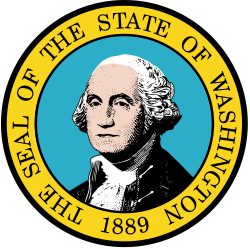November 2, 2004 | ||||||||||||||||||||||
All 9 Statewide Executive Offices | ||||||||||||||||||||||
|---|---|---|---|---|---|---|---|---|---|---|---|---|---|---|---|---|---|---|---|---|---|---|
| ||||||||||||||||||||||
| Elections in Washington (state) |
|---|
 |
Washington has 9 Executive seats, all elected at large. In 2004, all 9 positions were up for reelection.
November 2, 2004 | ||||||||||||||||||||||
All 9 Statewide Executive Offices | ||||||||||||||||||||||
|---|---|---|---|---|---|---|---|---|---|---|---|---|---|---|---|---|---|---|---|---|---|---|
| ||||||||||||||||||||||
| Elections in Washington (state) |
|---|
 |
Washington has 9 Executive seats, all elected at large. In 2004, all 9 positions were up for reelection.
After a machine and manual recount, Christine Gregoire won the election by 133 votes. [1]
| Party | Candidate | Votes | % | |
|---|---|---|---|---|
| Democratic | Christine Gregoire (incumbent) | 1,373,361 | 48.8731 | |
| Republican | Dino Rossi | 1,373,228 | 48.8684 | |
| Libertarian | Ruth Bennett | 63,464 | 2.2585 | |
| Total votes | 2,810,053 | 100.00 | ||
| Turnout | ||||
| Party | Candidate | Votes | % | |
|---|---|---|---|---|
| Democratic | Brad Owen (incumbent) | 1,443,505 | 54.39 | |
| Republican | Jim Wiest | 1,019,790 | 38.43 | |
| Libertarian | Jocelyn A Langlois | 117,147 | 4.41 | |
| Green | Bern Haggerty | 73,328 | 2.76 | |
| Total votes | 2,653,770 | 100.00 | ||
| Turnout | ||||
| Party | Candidate | Votes | % | |
|---|---|---|---|---|
| Republican | Sam Reed (incumbent) | 1,369,421 | 51.47 | |
| Democratic | Laura Ruderman | 1,209,299 | 45.45 | |
| Libertarian | Jacqueline Passey | 82,097 | 3.09 | |
| Total votes | 2,660,817 | 100.00 | ||
| Turnout | ||||
| Party | Candidate | Votes | % | |
|---|---|---|---|---|
| Democratic | Mike Murphy (incumbent) | 1,575,499 | 60.29 | |
| Republican | Oscar S. Lewis | 941,754 | 36.04 | |
| Libertarian | John Sample | 96,144 | 3.68 | |
| Total votes | 2,613,397 | 100.00 | ||
| Turnout | ||||
| Party | Candidate | Votes | % | |
|---|---|---|---|---|
| Democratic | Brian Sonntag (incumbent) | 1,668,575 | 63.89 | |
| Republican | Will Baker | 841,772 | 32.23 | |
| Libertarian | Jason G. Bush | 101,161 | 3.87 | |
| Total votes | 2,611,508 | 100.00 | ||
| Turnout | ||||
| Party | Candidate | Votes | % | |
|---|---|---|---|---|
| Republican | Rob McKenna | 1,425,368 | 52.98 | |
| Democratic | Deborah Senn | 1,163,964 | 43.27 | |
| Libertarian | J. Bradley Gibson | 56,792 | 2.11 | |
| Green | Paul Richmond | 44,020 | 1.64 | |
| Total votes | 2,559,642 | 100.00 | ||
| Turnout | ||||
| Party | Candidate | Votes | % | |
|---|---|---|---|---|
| Republican | Doug Sutherland (incumbent) | 1,309,441 | 49.96 | |
| Democratic | Mike Cooper | 1,223,207 | 46.67 | |
| Libertarian | Steve Layman | 88,171 | 3.36 | |
| Total votes | 2,620,819 | 100.00 | ||
| Turnout | ||||
| Party | Candidate | Votes | % | |
|---|---|---|---|---|
| Washington Non Partisan | Terry Bergeson (incumbent) | 1,293,560 | 55.51 | |
| Washington Non Partisan | Judith Billings | 1,036,912 | 44.49 | |
| Total votes | 2,330,472 | 100.00 | ||
| Turnout | ||||
| Party | Candidate | Votes | % | |
|---|---|---|---|---|
| Democratic | Mike Kreidler (incumbent) | 1,393,764 | 54.45 | |
| Republican | John Adams | 1,058,583 | 41.36 | |
| Libertarian | Stephen D. Steele | 107,295 | 4.19 | |
| Total votes | 2,559,642 | 100.00 | ||
| Turnout | ||||